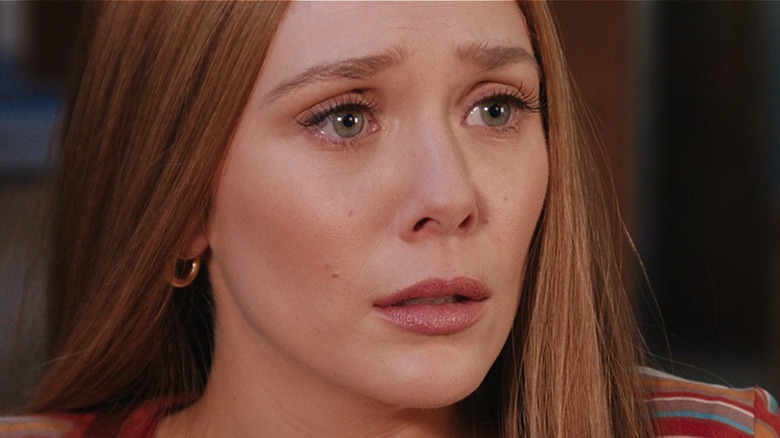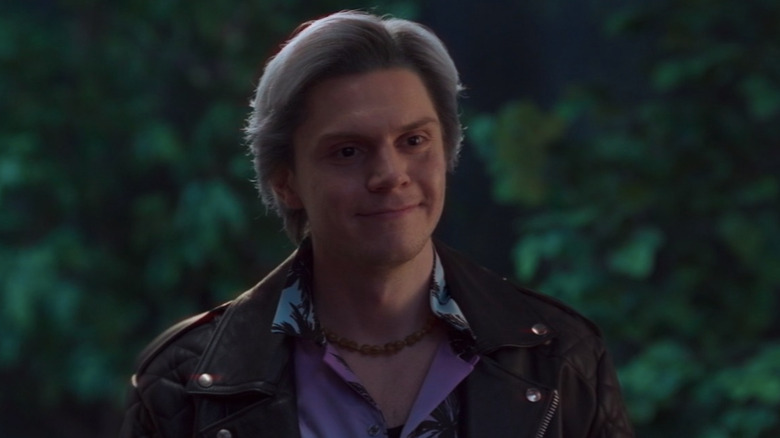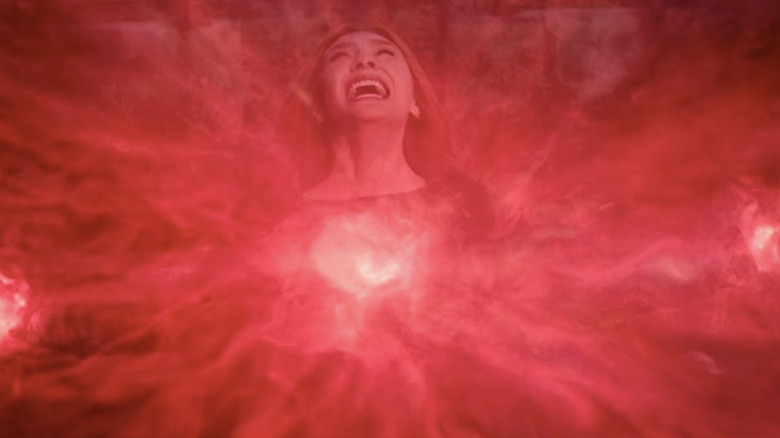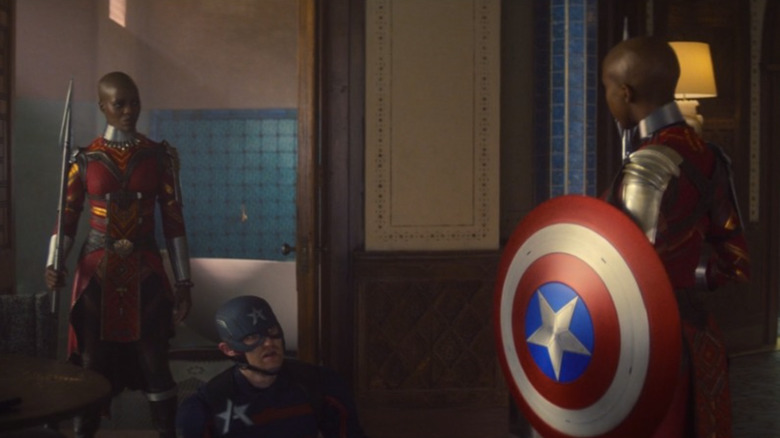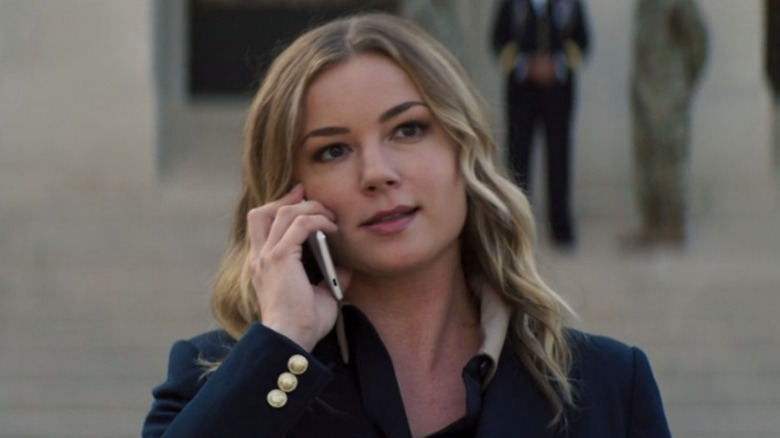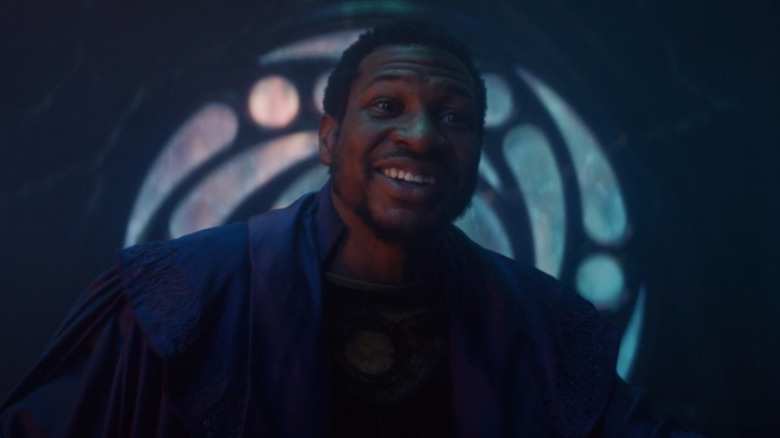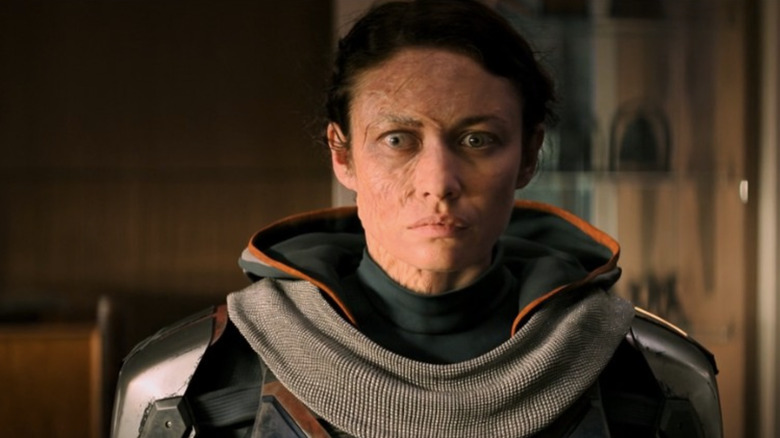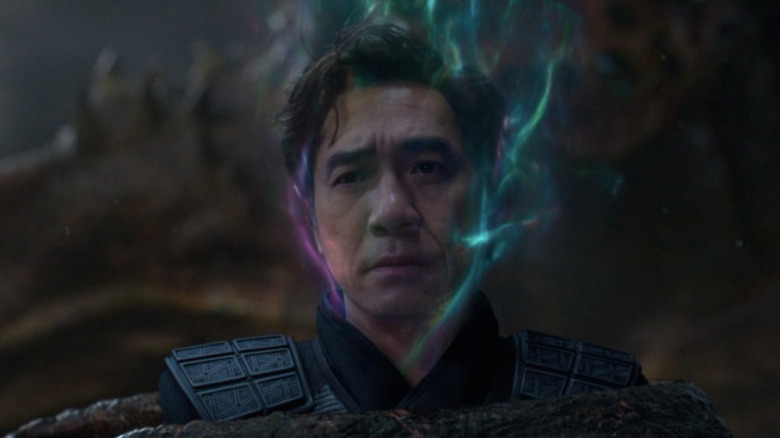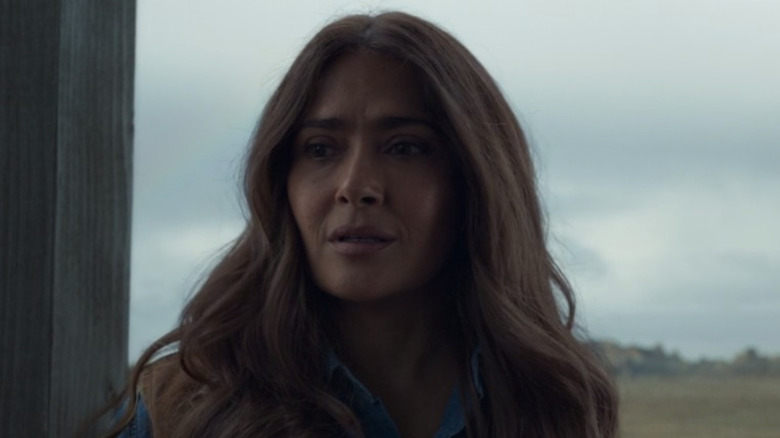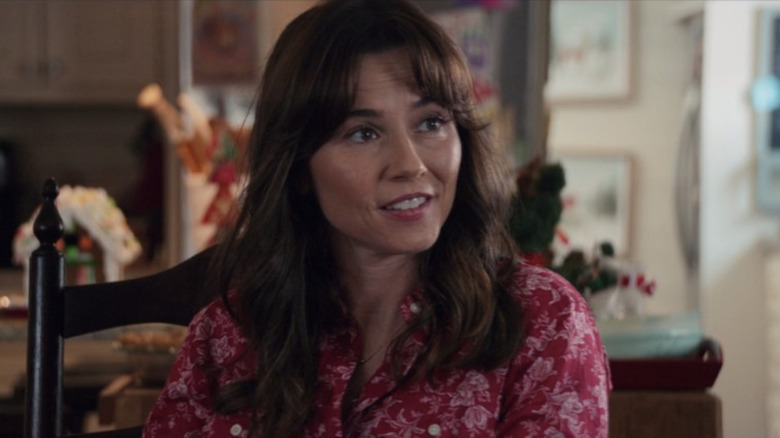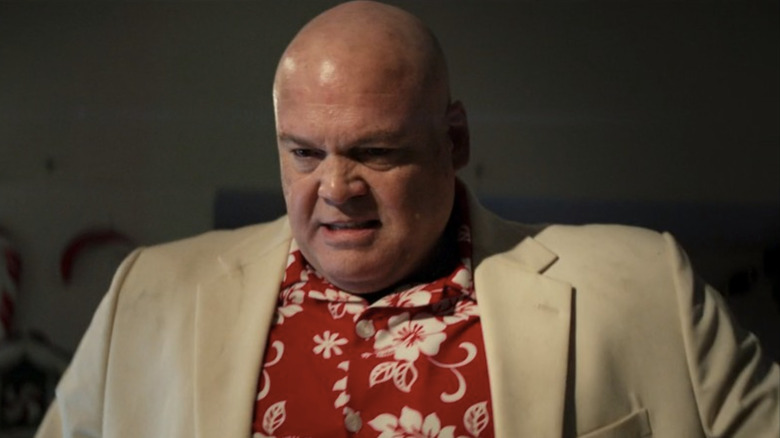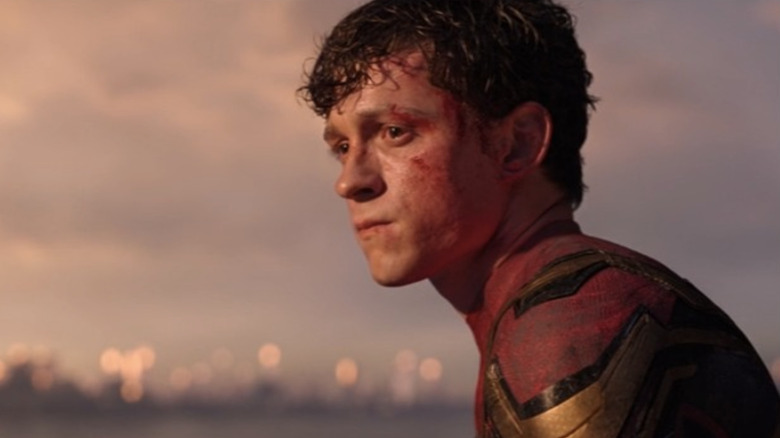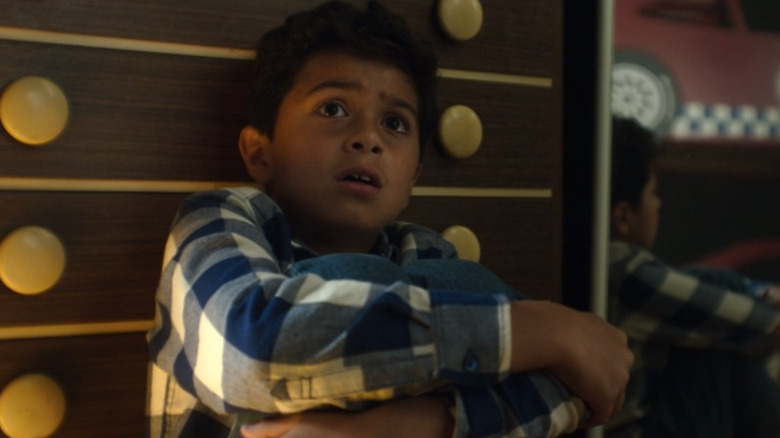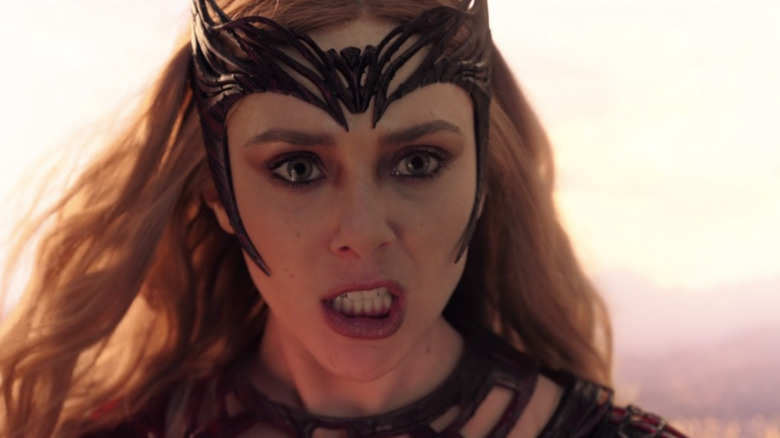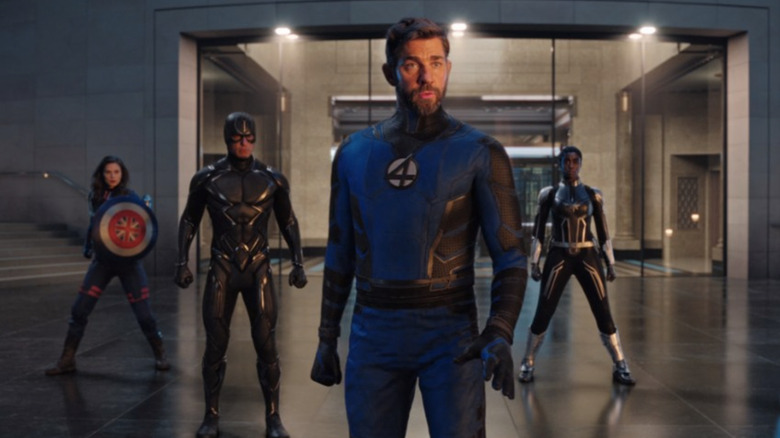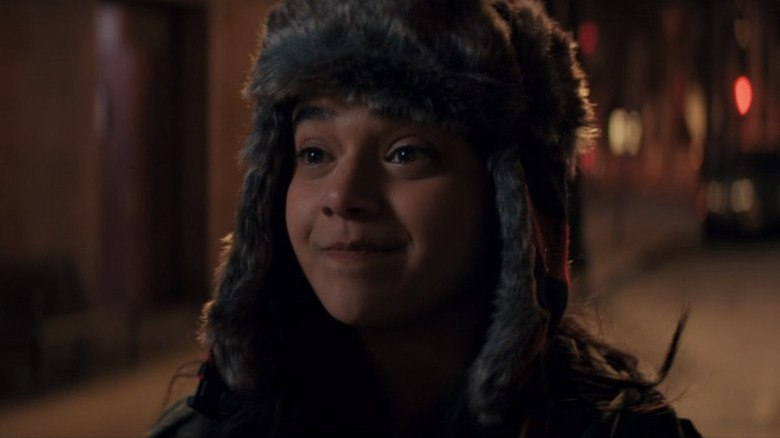Plot Twists We Didn't See Coming In Marvel's Phase 4
There's nothing quite like the feeling of collective shock in a darkened movie theater as an audience takes in a plot twist no one saw coming. Being invested in the world of a story and its characters is a special thing, and when a narrative keeps one step ahead of what's anticipated, magic happens.
Films within the Marvel Cinematic Universe have a peculiar uphill battle when it comes to keeping things fresh. With a decade and a half of movies and television under its belt, filmmakers face the challenge of avoiding what have become tropes via their own predecessors within the Marvel library.
According to Marvel head honcho Kevin Feige, Phase 4 of the MCU is the first of three to be included in the "Multiverse Saga," which will end at the conclusion of Phase 6 in 2025. In release order, here are the biggest plot twists nobody saw coming in Phase 4, which began with "WandaVision" in 2021 and whose most recent project at the time of this writing is 2022's "Ms. Marvel."
Evan Peters returns as Quicksilver... sort of
Evan Peters played Quicksilver in the Fox-produced "X-Men" films, which prior to 2021 had been disconnected from the MCU timeline. That all seemed to change, however, when Peters — not Arron Taylor-Johnson, whose Quicksilver died in "Avengers: Age of Ultron," showed up on the doorstep of Wanda Maximoff (Elizabeth Olsen) in 2021's "WandaVision."
The visage of Peters sent Marvel fans speculating wildly, seemingly opening the floodgates of the multiverse and perhaps indicating that such "X-Men" incarnations as Patrick Stewart's Professor X, Hugh Jackman's Logan and others could be in play.
So, was Peters playing the Taylor-Johnson version of Quicksilver, somehow returned to life? Or was he a visitor from an alternate universe, thus making the "X-Men" films tangentially canon to the MCU?
Much of this speculation would ultimately be quelled, as Peters' character in the show was revealed to be a random Westview citizen named Ralph Boener, cast by Agatha Harkness (Kathryn Hahn) to pretend to be Wanda's brother. Though this MacGuffin may have ultimately proven anticlimactic, it yielded some wild theories, and may have been a none-too-subtle foreshadowing of the chaos to come.
Westview exists from Wanda's grief
Throughout most of "WandaVision," it was always unclear exactly how the town of Westview manifested itself and who was overseeing this mysterious quasi-prison. While one big reveal of Westview's existence seemed to claim that it was "Agatha all along," that's not quite true. As the audience eventually learned, it was Wanda, grieving from Vision's death and a lifetime of trauma, who involuntarily created the town.
In a flashback towards the end of the series, the audience witnessed Wanda discovering Vision's corpse being scrounged for parts. Taken aback, Wanda fled to the plot of land Vision had bought for the two of them, dreaming they could build a house to "grow old in." With everyone in her life gone — Vision, her brother, her parents — and overcome with immense sadness, Wanda mourned the life she could have had in this very spot. In doing so, and thanks to magic within herself she doesn't yet fully understand, Westview was born. So, it was actually Wanda all along.
Wakandans avenge King T'Chaka
2021's "The Falcon and the Winter Soldier" mainly zoomed in on the "Captain America" franchise, focusing on characters like Sam Wilson, Bucky Barnes, Sharon Carter, and Baron Zemo, all of whom initially made their MCU debut in the "Captain America" films. Therefore, it came as a fun shock when Ayo, a member of Wakanda's Dora Milaje, unexpectedly approached Bucky at the end of an episode. Without warning, the world of "Black Panther" burst into this Captain America story.
The ensuing episodes further unspooled the Dora Milaje's presence in a way that made sense, but might have been easy to forget among the many plot points of the MCU at large. In 2016's "Captain America: Civil War," Zemo was responsible for the death of King T'Chaka, ruler of Wakanda. Bucky, who spent an extended period of time in Wakanda recovering from his former life as a brainwashed vigilante, had recently broken Zemo out of jail. That did not sit well with the Dora Milaje, intent on seeing the murderer of their king answer for his crimes. Ultimately, they would take Zemo away for imprisonment, with their inclusion in "The Falcon and the Winter Soldier" being a welcomed plot twist.
Sharon Carter is the Power Broker
Sam and Bucky found themselves reunited with Sharon Carter, niece of the late Agent Peggy Carter and former love interest of Steve Rogers, in "The Falcon and the Winter Soldier." A criminal in the eyes of the American government, Sharon was now living on Madripoor, an island of rogues. Throughout the series, there was constant mention of a Keyser Soze-esque mysterious figure known as the Power Broker, an authority on Madripoor's business who sounded like a new potential big bad.
But although Sharon appeared to be aiding Sam and Bucky throughout the series, she would eventually be revealed as the Power Broker — leading to a number of follow-up questions yet to be answered in the MCU.
Furthermore, in a post-credits scene for the series, Carter was seemingly pardoned by the US government and reinstated as an agent — but as we know, she'll be working as a covert spy. The intricate web of Sharon Carter's true intentions, and what may have led to this 180 in allegiances, continues to hang over the MCU.
The TVA is a facade
In 2021's first season of "Loki," the titular character found himself at the headquarters of the Time Variance Authority. The intricate organization's mission was seemingly to control the entire timeline of the universe and stamp out any "variants" which may occur. Going by the motto "for all time, always," the network's no-nonsense, bureaucratic ways were hellbent on maintaining the so-called "Sacred Timeline." Through a series of convoluted explanations and revelations, MCU fans learned that the TVA was seemingly responsible for maintaining the integrity of existence itself — no big deal — with figures known as the Time-Keepers overseeing the whole operation.
This headiness would ultimately be pulled out from under the rug of the audience, however, when Loki and Sylvie (his female variant) discovered that the TVA was merely a false front. Its employees were unaware that the Time-Keepers were robots, and many had past lives they had been made to forget.
The TVA, and its stated purpose of controlling the Sacred Timeline, was an elaborate facade hiding the wrongs committed by He Who Remains, aka Kang the Conqueror (Jonathan Majors), who disrupted time when multiple versions of himself tried to interfere long ago. There is more Kang to come in future MCU projects, but his initial reveal was a plot-twist disruption from the aforementioned logic of "Loki," perhaps laying the groundwork for future misdeeds yet to come.
The survivors of Black Widow and Hawkeye's visit to Budapest
In multiple "Avengers" movies, Black Widow and Hawkeye made reference to a wild adventure they shared in Budapest long ago; the details of this voyage, however, had never been made clear. Until 2021's "Black Widow" feature film.
As it turns out, Clint Barton (Jeremy Renner) was sent to Budapest to kill Natasha Romanoff, but instead he had recruited her to join S.H.I.E.L.D. Within the chaos of these circumstances, Barton and Romanoff killed General Dreykov (Ray Winstone), leader of the Black Widow assassins — or at least, they thought they did. Barton and Romanoff believed they also unintentionally killed Dreykov's innocent daughter, Antonia (Olga Kurylenko), in this mission.
Years later, as seen in "Widow," Natasha learns that Dreykov is alive and still keeps women as his Black Widow prisoners. Furthermore, Antonia survived Budapest, too, though disfigured and enduring cognitive damage, so much so that Dreykov controls her via a chip in her head. The events and fallout of Romanoff and Barton's long-ago meeting in Budapest is a twist within the self-contained story of "Black Widow," serving as resolution for a long-lingering question mark within the MCU.
Wenwu's redemption
Xu Wenwu (Tony Leung Chiu Wai) spent centuries as the Mandarin, leading acts of terrorism within an organization known as the Ten Rings. Wenwu's son, Shang-Chi, came to reckon with his father's exploits in adulthood, grappling with his family's history and seeking the retrieval of the physical objects the organization is named after, the Ten Rings, which possess magical abilities.
During the entirety of 2021's "Shang-Chi and the Legend of the Ten Rings," Wenwu was painted as a villain — a criminal of the world at large and a terrible father to his children, who suffer emotional baggage from their dad's shortcomings.
As MCU fans saw in the film, Wenwu mistakenly believed his deceased wife was alive and being held captive by the Dweller-In-Darkness, a creature best described as a cross between a demon and a dragon. This delusion acted as Wenwu's justification for his wrongdoings. So, what did it take for Wenwu to realize that his quest was a fool's errand? The answer is, his son.
While engaging the Dweller-In-Darkness in combat, Shang-Chi saved his father, despite Wenwu's history. Wenwu, in turn, awakened to his mistakes and reciprocated, sacrificing his life to the monster. It was a powerful last-minute redemption, with a longtime villain turning over of a new leaf, hoping his final act can make up for a lifetime of pain.
The Eternals discover their true purpose
The titular heroes of 2021's "Eternals" had a long held belief that they existed to keep Earth safe. As it turned out, they were actually just conduits to prepare Earth for extinction upon the birth of a being known as a Celestial.
As MCU fans discovered alongside the film's characters, they've already done this countless times with other planets — they just can't remember. What to the viewer was a mere plot twist was, to the characters, the disruption of their entire raison d'etre and indeed, their perception of the entire world's existence.
Now that they know the truth, the Eternals go forward unwilling to continue as pawns in a scheme for the mass extermination of all life forms on Earth. Instead, they are determined to challenge what's expected of them and save the planet in doing so. Like "Loki," the world-building of "Eternals" was quite complicated, and the repercussions of its big "gotcha" moment are still being considered.
Laura Barton's secret identity
Laura Barton (Linda Cardellini) made her MCU debut in 2015's "Avengers: Age of Ultron," when the audience learned that Hawkeye had a wife and three kids he's been keeping a secret — and safe — while performing his superheroic duties.
In "Ultron" and some other minor appearances, there was little to suggest the character was anything more than your average, ordinary, run-of-the-mill superhero spouse. That is, until the 2021 Disney+ series "Hawkeye," in which Laura suddenly seemed very invested in a Rolex watch that Hawkeye was trying to track down. The watch had connections to its former owner's identity, we were told, which could be compromised if the watch fell into the wrong hands. Hawkeye, of course, succeeded in procuring the watch, whose owner was revealed to be Laura. She's been a former agent of S.H.I.E.L.D., it seems, this whole time.
This plot twist presents a fun dynamic with which to revisit Cardellini's appearances up to this point. In hindsight, the character was keeping a huge part of herself a secret. Looking ahead to the future, it presents exciting opportunities to see her in action, perhaps, beyond the Barton household.
Marvel's Netflix shows get a second lease on life
From 2015-2019, Marvel Television created several shows for Netflix — "Daredevil," "Jessica Jones," "Luke Cage," "Iron Fist," "The Punisher," and "The Defenders" — that referenced events within the MCU, yet seemingly unrelated to Marvel Studios. When Disney+ launched in 2019, and Marvel Studios announced a slate of shows for the new streaming platform, the Netflix partnership was terminated and those stories and characters seemed likely to be narratively dismissed going forward. Nevertheless, fans expressed various desires to see the continuation of Charlie Cox's Matt Murdock, Krysten Ritter's Jessica Jones, Mike Colter's Luke Cage, Vincent D'Onofrio's Kingpin and more.
After a long period of radio silence, hope emerged in December 2021, which saw the sudden return of two beloved portrayals in a big way. First Kingpin (aka Wilson Fisk) appeared as a villain in "Hawkeye," with D'Onofrio reprising his "Daredevil" series work. That same month, Charlie Cox made a surprise appearance as Murdock (aka Daredevil) in "Spider-Man: No Way Home."
Details are still fuzzy as to whether these are the "same versions" of those characters from their Netflix incarnations (Fisk, in particular, seems to now possess something far closer to superpowers or strength and resiliency), or if what fans are seeing is in some sort of alternate timeline. Nevertheless, these are huge Marvel characters, instrumental in the stories of other favorites, so clearly they are a necessary piece of the puzzle and it's good to see the MCU won't be rolling the dice with recastings.
There's still more to come. Daredevil is returning in "She-Hulk: Attorney At Law," and will also star in his own Disney+ show, "Daredevil: Born Again."
The world forgets Peter Parker
While the biggest reveal of 2021's "Spider-Man: No Way Home" was undoubtedly the return of Tobey Maguire and Andrew Garfield as their respective versions of Peter Parker (fighting alongside Tom Holland in an epic dream come true for every Spidey fan), the film had even more tricks up its sleeve.
One could argue that the film's conclusion, with Doctor Strange wiping the world's memories of Peter Parker, will hold far longer-lasting repercussions in future MCU installments.
Thanks to a Strange spell gone wrong, individuals from countless universes aware that Peter Parker is Spider-Man were in the process of being transported to the MCU's primary timeline, the one in which Tom Holland exists as Peter Parker. While that spell could not be reversed, its outcome could be changed.
To save the timeline from imploding, Peter and Strange devised a desperate plan to rid the world's memory of Peter Parker, leaving the young hero completely alone. It was a juggernaut of an ending for an already an emotional story, with the poignancy of its final scenes bringing a tragically beautiful conclusion to this "Spider-Man" trilogy.
Marc Spector creates Steven Grant
Throughout the early episodes of 2022's Disney+ series "Moon Knight," the origin of how Steven Grant and Marc Spector shared a body was unknown. They appeared to be two distinct, polar-opposite personalities that were able to swap back and forth in a shared vessel.
It would later be revealed, however, that timid Marc created tough guy Steven following childhood trauma involving the death of his younger brother, Randall. While that child's death may have been an accident, Marc's mother nonetheless blamed him, coming to all but reject him as her son.
This horrific dynamic led Marc to fracture himself, seeking a compartmentalized, romanticized distraction from his situation altogether; finding inspiration from an action hero of the same name, Steven Grant was born.
After repressing the truth behind these memories for years, the audience watched as its hero realized he existed as alternate personalities, all orbiting an antihero known as "Moon Knight." The reveal of Steven's past, as presented to the audience, was somewhat reminiscent of the playbook for "WandaVision," provides context for a character's grief by pulling back the curtain on the elaborate distraction created as a means to forget the pain.
Wanda is the villain
Early trailers for 2022's "Doctor Strange in the Multiverse of Madness" seemed to tease a team-up of sorts, with Marvel's Sorcerer Supreme and its Scarlet Witch embarking on a mission together. The ads also made it seem like the film's plot would revolve around the fallout from Doctor Strange's multiverse-tampering actions in "Spider-Man: No Way Home." As it turns out, both were misdirection.
MCU fans were shocked, then, when Doctor Strange discovered Wanda was in control of the very monsters he'd sought out her support to help him fight. Determined to gain access to another reality in which she could be a mother to her twin boys — who were manifestations of her "WandaVision" magic — Wanda would stop at nothing to achieve this desire. Multifaceted and nuanced, with an incredible performance by Elizabeth Olsen, Wanda in "Multiverse of Madness" was surprisingly the antagonist.
The Illuminati
Trailers for "Doctor Strange in the Multiverse of Madness" hinted at the film's inclusion of multiverse heroes, and those were manifested as the Illuminati, a supergroup of Marvel luminaries. As teased with a subtle audio clip in the trailer, Patrick Stewart's version of Professor Charles Xavier was among them.
The roster included Professor X, as well as Karl Mordo (Chiwetel Ejiofor), Peggy Carter (Hayley Atwell), Maria Rambeau (Lashana Lynch), Blackagar Boltagon (Anson Mount), and Reed Richards (John Krasinski), with veteran Marvel actors returning to play the variants. Mr. Fantastic, as portrayed by John Krasinksi, was fancasting come true, as Marvel Studios President Kevin Feige was happy to indulge months of urging by fans to cast he and wife Emily Blunt among the new Fantastic Four.
While the jury is still out on whether Mr. Fantastic will look like Krasinksi in the actual "Fantastic 4" film coming in 2024, Reed's brief moment, alongside the rest of the other eclectic members of the Illuminati, was a thrilling tribute to Marvel media over the years.
Kamala Khan is a mutant
With Phase 4's inclusion in the MCU's "Multiverse Saga," opportunities have begun presenting themselves for the occasional cross-pollination of franchises. Chief among these seems to be "X-Men" alumni, as Evan Peters and Patrick Stewart were both members of the (at least half) beloved Fox "X-Men" movies and now have at least some tangential place in the MCU.
However, the MCU proper has yet to formally establish the franchise into its fold of superheroes. Therefore, a detail at the end of the 2022 series "Ms. Marvel" came as a huge reveal, perhaps setting up significant repercussions to come.
Early in the series, Kamala Khan (Iman Vellani) inherited a set of bangles from her grandmother and immediately gained superpowers, making it seem as though the power was derived from the bangles. But with help from the scientific findings of her friend Bruno (Matt Lintz), Kamala would come to learn that the powers were within her genetic structure all along, with the bangles simply unlocking what had already been present.
In the last episode's final moments, Bruno shared another layer of discovery, saying "Kamala, there's something different in your genes, like a mutation" as a music cue from "X-Men: The Animated Series" played in the background. This was big news in an MCU that had never said the word "mutant" before for various reasons, and was now seemingly laying the foundation for X-Men for the first time.
Kamala shrugged off the news, saying "Whatever it is, it's just gonna be another label." But could the revelation possibly open the door for "X-Men" to be more prominently featured in the MCU going forward? As Stan Lee might say, stay tuned, true believers.
